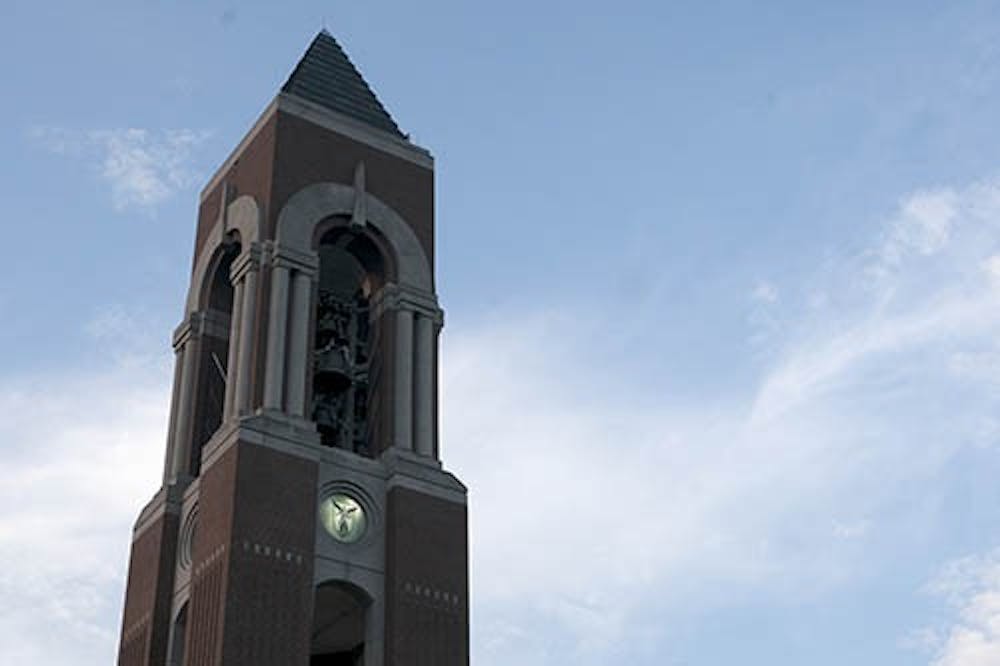University officials are scheduled to meet privately with state lawmakers on campus Thursday to discuss the legislators’ concerns about faculty freedom of speech over the intelligent design dispute.
“We really believe it is better to talk through these issues with folks,” said President Jo Ann Gora in an interview with the Daily News last week. “We have written lots, frankly, so we thought it would be much more effective to sit down and engage with a conversation which might lead to a better understanding.”
University spokesperson Joan Todd said three of the four lawmakers who have voiced their concerns to Gora have confirmed they will attend the Thursday meeting. She did not say which person had not scheduled yet.
The lawmakers are Dennis Kruse, Senate Education Committee chair, Sen. Travis Holdman, Sen. Greg Walker and Rep. Jeffrey Thompson. The four sent a letter in mid-March with concerns that improper procedures were followed by the university when investigating Eric Hedin, an assistant professor of physics and astronomy, after he was accused of teaching intelligent design instead of science in an Honors colloquium.
“We will always answer the questions that people have, but to me this is very clear,” Gora told the Daily News.
“This is not an issue of free speech. This is an issue of academic integrity. Intelligent design should not be taught in a science class. It is a religious belief, not a scientific fact. If professors want to discuss this in a class for a perspective in a religion or humanities class, [that is acceptable] but not in a science class, especially if you are getting core credit for a science course, which needs to be based on the principals of scientific proof.”
The four lawmakers, separately contacted by the DN, were unavailable to discuss their visit or the dispute and its effect on the university.
Last year Ball State received $133,401,503 from the state, according to the Indiana State Budget Agency. The legislature makes decisions about how much Ball State and other public institutions receive yearly.
Previously, the university said state cutbacks have reduced Ball State’s funding by more than $70 million in recent years. However in the last funding cycle, the school received an increase in funding and the state also supplied the final $30 million in funding for the giant geothermal project.
Overall, state support has been cut 40.7 percent in the past 25 years.
Despite the influence of the legislature on Ball State’s funding, Gora said she did not think the meeting or her statement on intelligent design will affect the university.
Since inviting the lawmakers to campus, the university’s position has been that any meetings would be private.
“I don’t think [an open meeting] is what’s warranted here. These are four legislators out of 150 who have asked to meet with us, and certainly we would want to accommodate that,” she said.
Kip Shawger, chair of Faculty Council, is glad Gora is defending the university’s position.
“We don’t want to have legislators dictating to us how we should teach our classes,” he said. “I can understand their concern and their opinions, and they can express their opinions, but certainly I hope they wouldn’t hold it against the university for its decision.”
Shawger said the closed, private meeting will allow both sides to fully explain their views, but fears the legislators may express their ideas in a different way.
“I would hate to think they would hold this against the university with budget cuts or anything like that,” he said. “But that certainly could happen if they disagree vehemently enough with the university’s stance.”
In general, Shawger said the issue has been blown out of proportion.
“I really think that in many instances, it’s the extreme right that is trying to dictate what can or cannot be taught in the academic setting, and that’s unfortunate, in my opinion,” he said.
Shawger said the Faculty Council hasn’t discussed the issue or released a statement about it.
The controversy started when Ball State received complaints from the Freedom from Religion Foundation in May that Hedin, an assistant professor of astronomy, was integrating intelligent design into one of his Honors courses.
“This class does not appear to be an honest investigation into the intersection of science and religion,” the letter said.
Intelligent design is the idea that the universe’s existence is due to a creator and it is closely aligned with Christianity and other major religions.
In May, Ball State began reviewing Hedin’s Boundaries of Science class by organizing a panel of four professors — three within the university and one from Indiana University. The Discovery Institute, an organization supporting intelligent design, sent Ball State a letter over the summer that said the review infringed on Hedin’s academic freedom.
Gora released a statement in late July saying intelligent design was not a science and academic freedom was not an issue at hand.
“Intelligent design is overwhelmingly deemed by the scientific community as a religious belief and not a scientific theory,” her statement said. “Therefore, intelligent design is not appropriate content for science courses.”
The university did not release much information regarding the manner in which it researched Hedin and his classes or the results from the review.
In September, the Discovery Institute sent another letter to Ball State that asked for review of four classes it claimed were integrating atheism or were taught by unqualified professors. Ball State announced its intention to review all of the Honors courses for the appropriateness of the teaching style, teachers’ qualifications and course materials.
Instead of an informal process previously used, Ball State moved to an advisory council and four subcommittees — social sciences, humanities, natural sciences and colloquia — to examine classes taught in the Honors College going forward.
Christopher Stephens and Emma Kate Fittes contributed to this story





